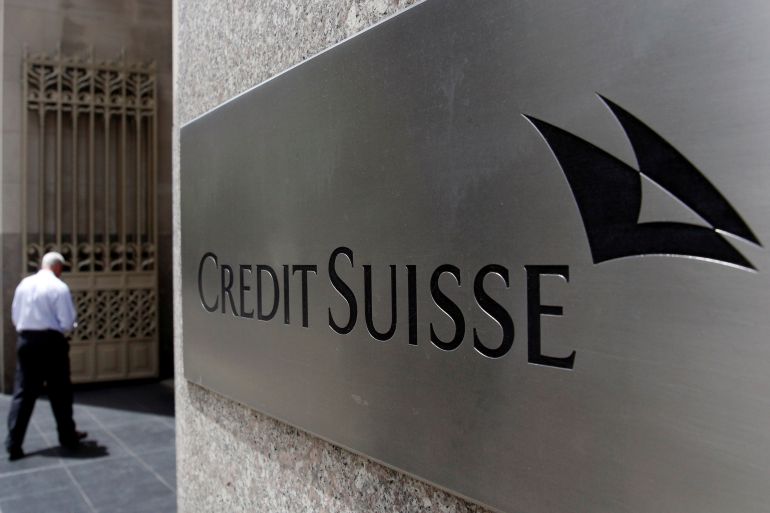Credit Suisse sees shares sink over restructuring concerns
Shares slid as much as 11.5 percent before rebounding as investors panicked over bank’s ability for a turnaround.

Credit Suisse Group AG saw its shares slide by as much as 11.5 percent and its bonds hit record lows on Monday before clawing back some of the losses amid concerns about the lender’s ability to restructure its business without asking for more money.
The situation prompted Swiss regulator FINMA and the Bank of England in London, where the lender has a major hub, to monitor what was happening and work closely together, one source familiar with the matter said.
Keep reading
list of 4 items‘Ideology trumping economy’: EU body warns firms souring on China
South Korea’s factory output falls in warning for global economy
US economy shrank from April through June, second time in a row
Some analysts and industry sources said the bank had enough capital and cash to deal with any crises. One analyst said investors feared the bank’s ability to execute on a turnaround strategy, which it is due to reveal on October 27.
Broader market malaise is also likely adding to investor worries, they said. Global financial markets have been particularly fragile of late, where rapidly rising interest rates, policy inconsistencies, recession fears and the war in Ukraine have unnerved investors.
“The key issue is the viability of the bank following its upcoming strategic review,” wrote ABN AMRO analyst Joost Beaumont, who added that adverse market conditions have raised the “execution risk of any strategic review”.
The Bank of England, FINMA and the Swiss finance ministry declined to comment.
Analysts at Citi said that widening credit spreads could exacerbate market fears and damage counterparty confidence, as well as drive funding costs higher.
“In the long-term the further the share price falls the more dilutive any capital raise becomes (and vice versa), which constrains the magnitude of any investment banking restructuring that CS can undertake,” the analysts said.
Strategy review
Credit Suisse, one of the largest in Europe and one of Switzerland’s global systemically important banks, has had to raise capital, halt share buybacks, cut its dividend and revamp management after losing more than $5bn from the collapse of investment firm Archegos in March 2021, when it also had to suspend client funds linked to failed financier Greensill.
In July, Credit Suisse announced its second strategy review in a year and replaced its chief executive, bringing in restructuring expert Ulrich Koerner to scale back investment banking and cut more than $1bn in costs.
The bank is considering measures to scale back its investment bank into a “capital-light, advisory-led” business, and is evaluating strategic options for the securitised products business, Credit Suisse has said.
Citing people familiar with the situation, Reuters reported last month that Credit Suisse was sounding out investors for new cash as it attempts its overhaul.
Falling shares
Credit Suisse shares fell as much as 11.5 percent before coming off early lows to end down just 1 percent. Its international bonds also showed the strain, with euro-denominated bonds dropping to record lows before clawing back some losses in the afternoon.
The embattled lender’s longer-dated bonds suffered the sharpest declines.
Spreads on Credit Suisse’s US dollar bonds were quoted on Monday morning about 40 to 90 basis points wider across their outstanding bonds. One basis point (bps) is one-hundredth of one percentage point.
“It is pretty ugly for CS bonds,” one syndicate banker said.
Credit Suisse credit default swaps (CDS) soared higher on Monday, adding 105 basis points from Friday’s close to trade at 355 bps, their highest level in at least more than two decades. The CDS measure the cost to insure the bank’s bonds and were a much lower 57 bps at the start of the year. Monday’s spike was an indication of how risky investors find the bank now.
Bank executives spent the weekend reassuring large clients, counterparties and investors about its liquidity and capital, the Financial Times reported on Sunday.
That followed Chief Executive Koerner’s telling staff last week that the bank, whose market capitalisation dropped to a record low of 9.73 billion Swiss francs ($9.81bn) on Monday, has solid capital and liquidity.
Some investors said they were not panicking.
“They’ll be recapitalised by the public markets if the environment is good in a month or two, or they’ll be backstopped by the Swiss government if the environment is bad,” said Thomas Hayes, chairman and managing member of New York-based Great Hill Capital.
Liquidity ‘healthy’
JPMorgan analysts said in a research note on Monday that, based on its financials at the end of the second quarter, they view Credit Suisse’s capital and liquidity as “healthy”.
Credit Suisse had total assets of 727 billion Swiss francs ($732.7bn) at the end of the second quarter, of which 159 billion Swiss francs ($160.3bn) was cash and due from banks, while 101 billion Swiss francs ($101.8bn) was trading assets, it noted.
Still, investors are questioning how much capital the bank may need to raise to fund the cost of restructuring, analysts at Jefferies wrote in a note to clients on Monday. Also, the bank is now potentially a forced seller of assets, they said.
Deutsche Bank analysts in August estimated a capital shortfall of at least 4 billion Swiss francs ($4.03bn).